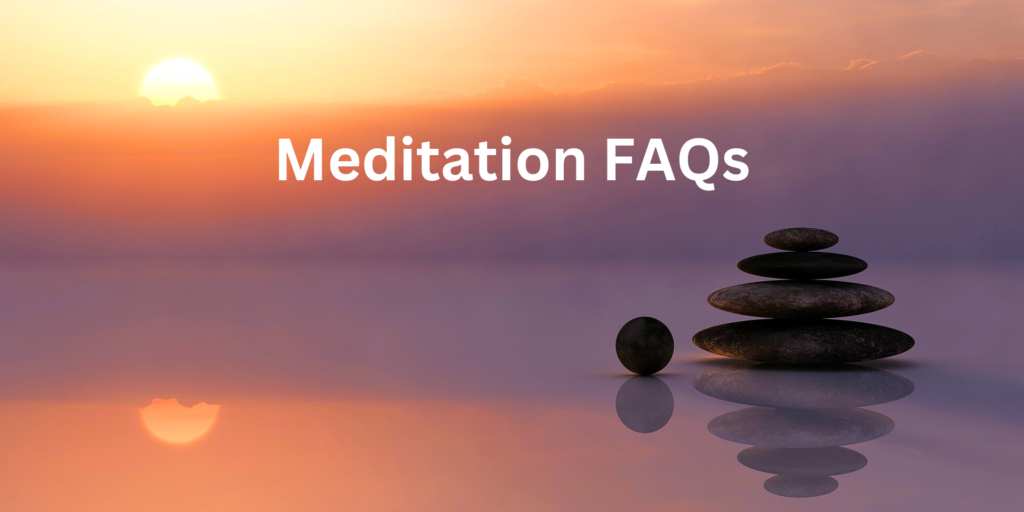
Here are answers to some of the most commonly asked questions about meditation:
How do I meditate?
For most types of meditation you try to keep your mind on the focus, (which may be an aspect of your breath, or a mantra, etc), and when you notice that other thoughts have come into your mind, you very gently accept those thoughts. You do not judge those thoughts, or get emotionally involved with them. You very calmly let them go, and without any frustration at all, you return your mind to the focus. The key is to do this calmly, gently and without frustration, no matter how long you have been away from your focus.
Meditation is not about creating an empty mind with no thoughts at all. That is just not realistic. Instead, you have to do the above exercise of calmly accepting your thoughts and letting them go again, and again, and again, and again. You constantly have to do it. This is the practice of focussed meditation.
Open-awareness meditation is practiced slightly differently. With this type of meditation, you are observing your thoughts and allowing them to remain in your mind until they fade naturally. However you are still practicing not reacting to them, not judging them and not getting emotionally involved with them.
Think of Meditation like a mental exercise. Any exercise is challenging and hard until we are used to doing it, and it’s the same with Meditation. But the rewards and benefits that come with a regular practice really do make it worthwhile putting in the effort.
Just as physical exercise becomes easier with practice, so does the practice of meditation. It also becomes much more enjoyable, and you develop a mental fitness that also becomes easier to maintain.
As you improve, you may wish to self-guide and use just the timer, instead of being guided. You can choose any type of meditation to practice self-guiding with the timer. Use the interval bell as a reminder to come back to your meditation in case your mind has wandered. As you improve, slowly extend the interval time. Your rate of progression with meditation will increase significantly once you start doing this.
We hope you enjoy your meditation journey. Remember, when you practice meditation consistently, you are rewiring your brain. You are slowly creating a new and improved ‘you’.
Can I lie down to meditate?
Yes, you can lie down to meditate, but we strongly recommend you don’t! It’s better to sit upright in a comfortable chair instead. If you lie down, you will probably fall asleep and won’t receive all the benefits meditation brings. The most important thing though, is to be comfortable. If lying down is the only way for you to be comfortable, then do so.
Do I need to sit on the floor to meditate?
No, you do not need to sit on the floor to meditate. It is customary in some cultures but this has come about simply because there were no chairs to sit in. The most important thing is to be comfortable. Sitting in a chair and keeping the spine straight and upright is the most practical and what we recommend.
Why do I get sleepy when I meditate?
When you meditate the dominant brainwaves become slower, moving from beta frequency to alpha to theta (light sleep). You can feel sleepy when you first start meditating because your brain hasn’t adjusted to the meditative state, and the dominant brainwaves continue to slow in frequency until you are asleep. It takes a few weeks for your brain to adjust, and then you can meditate without feeling sleepy. You reach a deeply relaxed state, with dominant brainwaves borderline between alpha and theta frequency, but you are still very aware.
Can I breathe through my mouth to meditate?
Meditation is best done breathing in and out through the nostrils. This helps slow the breath. However, if this is not comfortable for you, make any adjustments you need to, which may include breathing through the mouth.
What are the benefits of meditation?
Meditation has now been shown scientifically to have many benefits, including the following:
- Reduce stress
- Improve concentration and memory
- Develop thinking creatively and flexibly
- Build more brain cells
- Increase longevity (slow down aging)
- Increase positive emotions
- Increase resilience
- Build empathy and emotional intelligence
- Reduces anxiety
- Develop acceptance (of ourselves and others and events)
- Lead to better relationships
- Reduce the occurrence of stress-related health issues (including heart disease, stomach ulcers, gastro-intestinal issues).
- Increase immunity
- Reduce blood pressure
- Improve sleep
If you’d like to learn more about meditation and the science behind it and its benefits, you may wish to enrol in our Meditation Teacher Training Course.